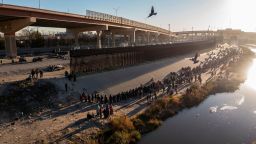El Paso, Texas, Mayor Oscar Leeser declared a state of emergency on Saturday evening following a surge of migrants who have recently arrived in the community and he says are living in unsafe conditions.
The mayor, who had previously declined to issue a state of emergency, said “hundreds” of migrants are on the streets in unsafe conditions while temperatures are beginning to drop, and things could get much worse when a Trump-era border policy is lifted Wednesday, which federal officials expect will lead to an increase in migrant arrivals.
“We know that the influx on Wednesday will be incredible,” the mayor said in a news conference, adding later some officials have estimated the number of arriving migrants could more than double after December 21.
Considering all those factors, “we felt it was a proper time today to call a state of emergency,” he added.
Earlier this week, a senior Border Patrol official said more than 2,400 migrants crossed into the US near El Paso daily over the weekend, describing the number as a “major surge in illegal crossings” in the area.
While those numbers climb and the region’s resources are already severely strained, Wednesday will also mark the court-ordered end of Title 42, a policy which has, since the onset of the Covid-19 pandemic, allowed officials to turn away migrants encountered at the southern border.
The deadline has federal officials bracing for a further increase in border crossings.
El Paso’s mayor said he previously did not call an emergency because local leaders and other partners had been able to respond to the arrivals, but, he added, it is no longer the case.
“I said from the beginning, that I would call it when I felt that either our asylum-seekers, or our community, was not safe,” Leesersaid Saturday. “I really believe that today our asylum-seekers are not safe as we have hundreds and hundreds on the streets and that’s not the way we want to treat people.”
The declaration will allow local leaders to request additional resources from the state like personnel shelters and transportation, the city said in a news release.
An Emergency Operations Center will also be activated and emergency management plans will be put in place to help “protect the health, safety and welfare of the migrants and our community.”
The city added teams have already been deployed in the downtown area who are helping migrants arrange transportation and offering them shelter.
Hundreds of migrants released on streets daily
Speaking with CNN’s Boris Sanchez on Saturday morning, before the mayor’s news conference, one El Paso official said the city’s resources were already strained, and he worried what the lifting of Title 42 on Wednesday would mean.
About “a few hundred” migrants daily have recently been getting released on the city’s streets, said Mario D’Agostino, El Paso’s deputy city manager.
“As Title 42 goes away, how’s that going to add to it?” D’Agostino said.
Many of the migrants who are coming into El Paso are not looking to stay, he said, but the city’s infrastructure was struggling to support the crowds pouring in and trickling out.
“We do have a moderate-sized airport, we have a couple of smaller bus terminals, but that’s not enough to keep up with normal holiday traffic,” D’Agostino said.
Now on top of that traffic, hundreds of migrants are looking to leave the city daily. “We don’t have the infrastructure – the flights out of El Paso, the buses out of El Paso – to keep up with this flow.”
During the evening news conference D’Agostino said the declaration will allow city officials to tap in to larger sheltering operations, work with nonprofit organizations who are looking to assist, and help provide them with appropriate facilities, among other things.


